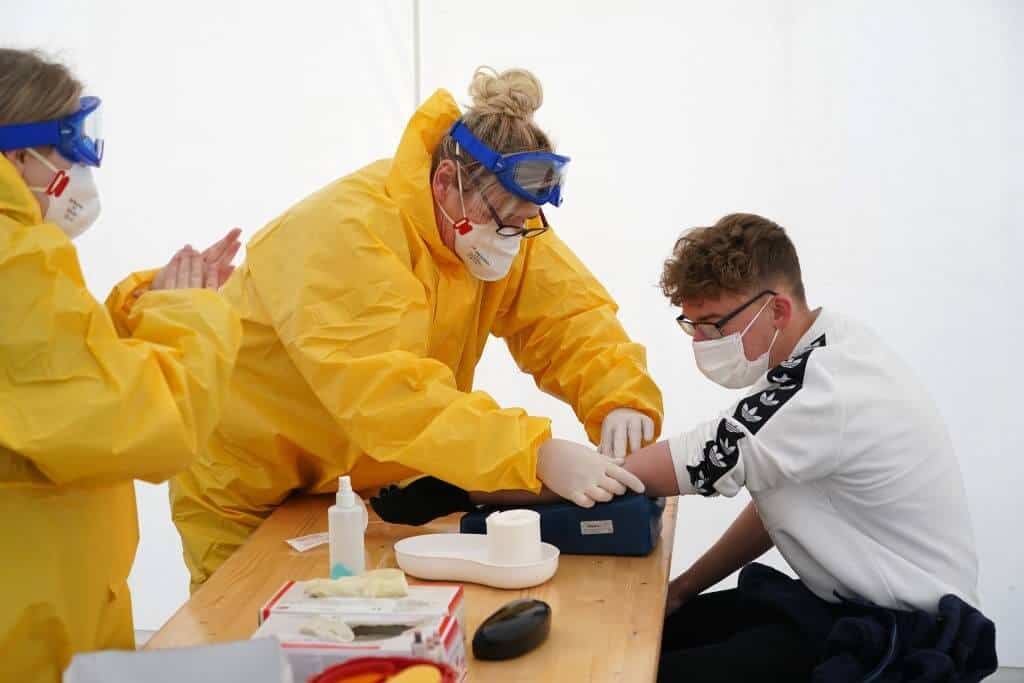High Blood Pressure At Night Doubles Chance Of Mortality In Diabetics
Nikki Attkisson | Last Updated : September 30, 2021Throughout sleeping, blood pressure usually drops or dips. Non-dipping occurs when blood pressure doesn’t drop sufficiently throughout the evening.
High Blood Pressure At Night Doubles Chance Of Mortality In Diabetics
The condition known as “reverse dipping” occurs when blood pressure rises at night compared to day readings.

For those who suffer from Hypertension, it is much needed to stay away from anxiety and go for enough rest. However, as per the study, it is found that those who suffer from High Blood Pressure and Diabetes have higher chances of fatality while asleep. Hence it is advised by experts for such patients to keep away from stress and anxiety while going for rest else; it may be critical for their health condition.
In people with type 1 and type 2 diabetes, such aberrant blood pressure trends were linked to an elevated chance of cardiac diseases and mortality. Individuals with type 1 and type 2 diabetes who had their blood pressure risen throughout the night were much over twice as likely to die as individuals whose heart rate “dropped” during sleep.
“Previous studies have shown that non-dipping is linked to kidney and cardiovascular disease in healthy individuals and people with hypertension, or type 1 or type 2 diabetes,” said study author Martina Chiriac, M.D., an investigator at the department of clinical and experimental medicine.
“However, the long-term implications of non-dipping on mortality in adults with diabetes are unknown, and evidence on reverse dippers is rare. We wanted to look into these two characteristics to see if abnormal blood pressure patterns could predict mortality risk in people with type 1 or type 2 diabetes.”
“Low heart rate variability is associated with worse health for people with heart failure and increases the risk of coronary artery disease in the general population. However, there is still a scarcity of long-term information on the association of reduced heart rate variability with mortality among people with type 1 or type 2 diabetes,” Chiriacò said.
And over 50% of the subjects had a non-dipping heart rate throughout the nighttime, while 20 percent had reversal dippers. They reportedly discovered:
- Almost a third of reversed dippers showed heart sympathetic neuroma, compared to only 11% of non-dippers. The neurons that regulate the heart’s blood arteries are destroyed in cardiac function neuropathy, a significant consequence of diabetes. Increased pulse rate control is affected by nerve injury, raising the likelihood of mortality and heart problems.
- When contrasted to dippers, reversed dippers experienced a 2.5-year worse survival rate, while non-dippers exhibited a 1.1-year lower surviving rate.
- Backward dippers are more prone to be elderly, have been medicated for Hypertension, and have symptoms of cardiac disease caused by Hypertension.
“Our study shows that 1 in 10 people with type 1 or type 2 diabetes could be a reverse dipper and that this condition likely more than doubles the risk of death from any cause over 21 years, regardless of blood pressure control,” Chiriacò said. “It is important that health care professionals look for abnormal blood pressure dipping patterns in people with type 1 or type 2 diabetes. There are strategies to reduce blood pressure during the night.”
The investigators did not specify the frequency of cardiac illness amongst patients with diabetes at the start of the experiment, which might have aided in establishing if there are variations in death hazard between many who had previous cardiovascular and those who could not. Furthermore, because the research respondents are mostly white individuals, the results should be confirmed in groups with more racial-cultural variety. “This is particularly important since non-dipping has been reported to be more common among people with African or Hispanic ancestry,” Chiriacò said.
With over 15 years as a practicing journalist, Nikki Attkisson found herself at Powdersville Post now after working at several other publications. She is an award-winning journalist with an entrepreneurial spirit and worked as a journalist covering technology, innovation, environmental issues, politics, health etc. Nikki Attkisson has also worked on product development, content strategy, and editorial management for numerous media companies. She began her career at local news stations and worked as a reporter in national newspapers.
